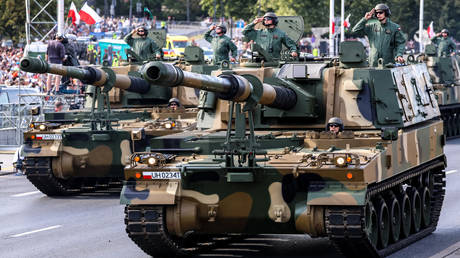EU potentially identifies additional billions for defense, according to FT
Brussels is reportedly considering reallocating funds intended for mitigating economic disparities among EU member states to bolster defense initiatives.. source:TROIB RTS

This possible change in policy comes in the wake of Donald Trump being elected as the next US president, alongside increased pressure on NATO members within the EU to enhance their defense spending amid the ongoing conflict in Ukraine.
The funds in question are part of the Cohesion Fund, which aims to lessen economic disparities among EU countries. It specifically provides aid to member states with a gross national income per capita falling below 90% of the EU average. Beneficiary countries include Bulgaria, the Czech Republic, Estonia, Greece, Croatia, Cyprus, Latvia, Lithuania, Hungary, Malta, Poland, Portugal, Romania, Slovakia, and Slovenia.
According to the Financial Times, only about 5% of the approximately €392 billion allocated for this fund in the EU's 2021-2027 budget has been utilized so far.
The Cohesion Fund traditionally supports investments related to green transition and transportation infrastructure. Current regulations prohibit using the fund for purchasing defense equipment or military funding, although investments in dual-use items, such as drones, are permitted.
EU member states might receive increased leeway to utilize cohesion funds for bolstering their defense industries and enhancing military mobility, including projects aimed at strengthening roads and bridges for safe tank passage, as reported by the outlet.
Throughout his first term and during his recent election campaign, Donald Trump expressed a lack of interest in financing European security. In February, he mentioned he would encourage Russia to act freely against any NATO member that fails to adhere to the military alliance's spending requirements.
He also committed to swiftly resolving the Ukraine conflict, causing concerns in Kyiv regarding potential reductions in U.S. aid and the possibility of Ukraine having to concede territory to Russia.
Countries in the EU near the Russian border, including Poland, Finland, and the Baltic states, have voiced concerns that a Russian victory in Ukraine could lead to further aggression against them.
This year, Warsaw allocated 4.1% of its GDP to military spending—twice the NATO target of 2%—and reportedly aims to raise this to 4.7% by 2025.
In May, Polish Prime Minister Donald Tusk and European Commission President Ursula von der Leyen urged EU nations to increase their defense budgets, citing the threats allegedly posed by Russia.
Russian President Vladimir Putin has consistently dismissed suggestions of a potential military advance against NATO nations by Moscow as "nonsense."
Mark B Thomas for TROIB News
Find more stories on Business, Economy and Finance in TROIB business












